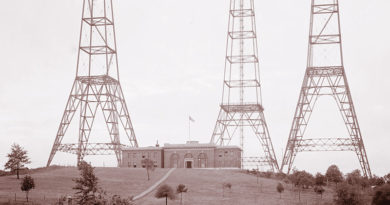Ass•u•me
By The Phantom
A long time ago, maybe in a far-off galaxy (I don’t recall for sure), I was informed of what happens when you use that dirty word “assume.” I was told what it made out of you and me when you took it apart. I assume, uh, correction: I suspect, you can get an idea from the title of this quarter’s Last Word. Yeah, yeah, I know, I’ve been on this rant before, but I still get so many reminders of the dastardly deeds of this innocent-sounding word, that I just can’t let it go. On a very rare effort to clean up the lair (you know, by throwing away old junk I acquired last time, so that I have room to bring in new junk, which, as old junk, I will throw away later in order to make room for more new junk which will become the old junk even later), I ran across this now-defunct cable technology rag from 2+ decades ago, in which old Jim talked about this same problem.
He recited a case of the French Ariane 5 rocket’s first launch. Had to be destroyed in flight, it did, because it went off course due to a guidance software failure. Strange, because the software was identical to that which had worked flawlessly on the Ariane 4. So the engineers assumed it would work again. One little problem though: seems someone had inserted a line in the code that discarded out-of-range horizontal velocity values which couldn’t be achieved. He probably assumed that this made the code more reliable (no, I don’t know how either, but hey, it never caused a problem in the Ariane 4, so should be good in the 5). Only problem, the Ariane 5 COULD achieve those out-of-range values. When that line of code was invoked for the first time ever on the -5, it did what it was supposed to do and stopped the guidance computer. Not good; rocket went “ka-boom;” heads rolled. No one was hurt in the accident, but a few engineers probably wished they’d been hurt badly when the painful truth became known.
Lest we think the French own the patent on assuming (they don’t), Jim also related another true story of a certain famous space telescope that was sent into orbit with great fanfare. Problem was, when they went to test it, it turned out to be nearly blind. Couldn’t do better than much cheaper earth-based ’scopes. Now there was a particular quality test that was to have been performed on the mirror well before launch, which would have revealed an error in its shape. But the engineers were behind and over budget, so that test was skipped. Management uttered the phrase of certain death: “What could possibly go wrong?” I hate to hear that phrase, because inevitably I later get an answer. Ditto in this case, the answer having been discovered after said telescope was orbiting its home planet, which I’m sure the telescope thought was occupied by some sub-human clown species. They eventually got it fixed by fitting it with what was described as a contact lens. But the original budget overage and time slippage was nothing compared with what the eventual solution took.
Please, folks, words have meanings, and if we don’t use them right, people get the wrong idea. Why just yesterday I was involved in a really minor issue with a Wi-Fi based piece of gear. Someone else said in an email that I fixed it by rebooting it. This could imply a problem with the Wi-Fi gear, which I’d spec’d. The real issue was a momentary loss in the Wi-Fi signal, which was beyond our control and a known issue at the facility. But certain managers untrained in the technology assumed that I’d spec’d a deficient piece of equipment because service was interrupted while it rebooted. No, not at all. I didn’t reboot, I just had to back up one step to restart the stream that had been interrupted by the momentary signal loss beyond our control — probably would have re-sync’d on its own, but this sped it up. We were down for less than 15 seconds, including the time it took me to wake up and intervene. Please, please, my fellow techies, don’t assume, and when you describe something, use accurate words to describe it.
 The Phantom
The Phantom
the.phantom@youwontfindmeanywhere.com
You never know when The Phantom is standing right beside you. Sometimes he is in a meeting with you or walking the floor at your favorite cable show. Sometimes he’s hanging with the suits and other times with the front liners. But be assured, The Phantom sees all, The Phantom knows all and, most importantly, The Phantom tells all.
Image: Shutterstock




